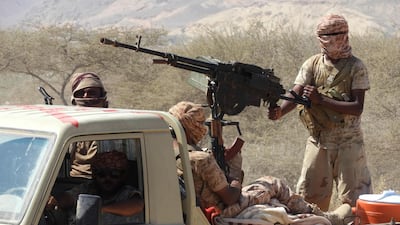Special Yemeni forces have driven Al Qaeda from most of its strongholds in southern Yemen and killed or captured dozens of its leaders, but the terrorist group still poses a threat through sleeper cells, local commanders say.
This week, an attack by Al Qaeda militants killed five soldiers of the Security Belt forces and injured four others at a checkpoint in Ahwar district of Abyan.
The UAE-trained and supported Security Belt and elite forces have since 2016 been battling Al Qaeda and ISIL in Abyan, Shabwa and Hadramawt provinces in southern Yemen.
A Security Belt commander in Abyan told The National that its forces had paid a high price in the battle against Al Qaeda as well as ISIS, which took advantage of the continuing civil war to establish itself in Yemen. Dozens of soldiers were killed in military operations and Al Qaeda sleeper cells continued to stage ambushes, said the commander, who asked not to be named.
“The Security Belt forces along with the elite forces in Shabwa and Hadramawt have scored big victories against terrorist groups in the southern provinces, which have long been havens for Al Qaeda and ISIL,” said AbdulAziz Badas, a journalist in Abyan who works for the Security Belt.
"In a year and half the Security Belt forces were able to drive Al Qaeda and ISIL out of Abyan, which was considered the main stronghold for them over the past 10 years. Military operations by the Yemeni army under former president Ali Abdullah Saleh failed to drive Al Qaeda out," Mr Badas said.
_______________
Read more:
US has struck Al Qaeda in Yemen six times in recent months
US seizes major weapons cache from boat in Gulf of Aden
US officials confident that feared Al Qaeda bomb maker is dead
_______________
"The situation in our province before the Security Belt force drove the terrorist groups out was very horrible,” said Naser Al Salahi, a leader in the public resistance militia in Abyan. “The city was turned into a city of ghosts. Al Qaeda and ISIL spread horror and blood everywhere, moving freely."
Mr Badas said the Security Belt forces began fighting the extremist groups in Abyan, Aden and Lahej provinces in April 2016 and had killed more than 200 militants and arrested more than 500, some of them considered serious threats not just in Yemen, but in the Arabian Peninsula.
In Abyan, the force has launched several campaigns against both militant groups since August last year, the local commander told The National.
“We liberated Zinjibar district, Khabr Al Maraqisha area, and villages in Mowgan area near the Ahwar district where Al Qaeda killed the five soldiers on Wednesday,” he said. “We scored big victories against Al Qaeda and ISIL in Al Mahfed district, which is considered the main stronghold of Al Qaeda because it borders Shabwa province, and we cleared pockets of Al Qaeda in the mountains of Al Wadhe'a district where our forces killed two top leaders - Hassan Basaria and Murad Doubali," the commander said
Security Belt forces had killed or captured more than 20 top Al Qaeda leaders, including Khaled Abdunabi, who was wanted by the US and surrendered, and his brother Ahmed, who was killed, he said.
In neighbouring Shabwa province, the battle against the extremists is being carried out by the elite forces formed last year by the UAE. Their commander, Col Mohammed Salem Al Buhar, told The National his forces had driven Al Qaeda from hideouts in Azzan district, Mayfa'ah, Habban and along the international coastal road crossing Harad and Al Aber and linking Yemen to Saudi Arabia.
"We led and we still lead battles with Al Qaeda and Daesh, terrorist organisations that have been trying to turn the oil-rich province of Shabwa into an Islamic state," Colonel Al Buhar said.
Besides securing former extremist strongholds, the elite forces have killed dangerous Al Qaeda leaders such as Basel Al Merwah, Mohammed Ali Al Ghoulaisy and AbdulKareem Sabeih, while dozens of fighters had been killed or arrested since August last year, Col Al Buhar said.
"We have been countering terrorism on behalf of the region and the world as well," Colonel Al Buhar said. "We don't receive support from any side, even the Yemeni government. All our budget and our weapons and our infrastructure are from the UAE."

